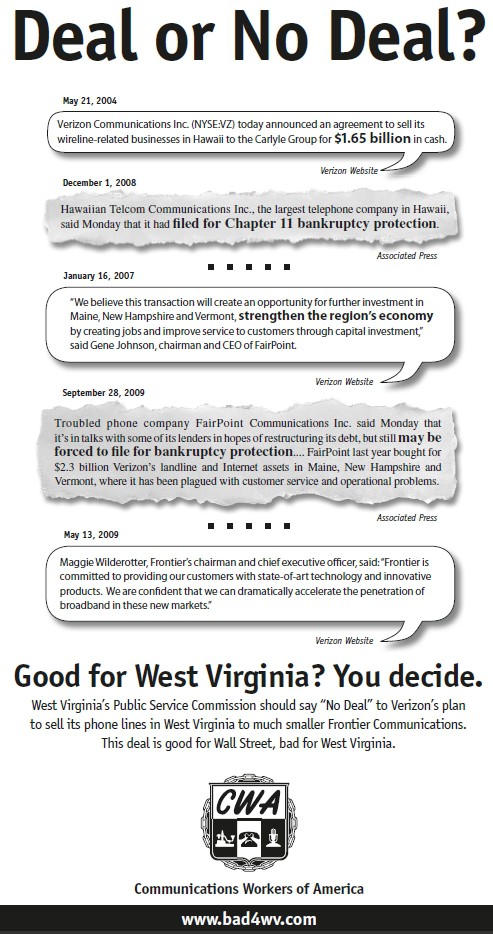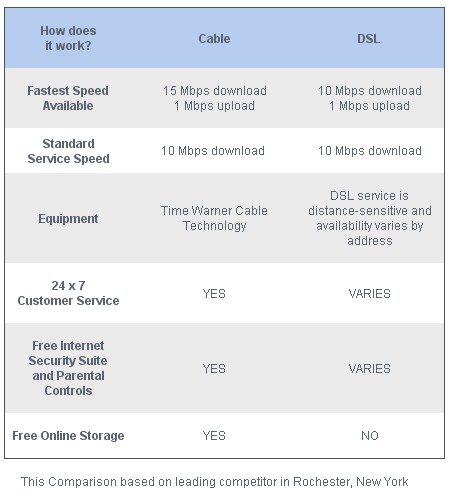 Hawaii’s landline telephone company, Hawaiian Telcom (HawTel), is awaiting approval from the state’s Public Utility Commission for its $460 million, stand-alone reorganization plan. The company, launched in 2005 from assets acquired from Verizon Hawaii, Inc., by the politically connected global private equity investment firm The Carlyle Group, lasted less than four years before declaring bankruptcy.
Hawaii’s landline telephone company, Hawaiian Telcom (HawTel), is awaiting approval from the state’s Public Utility Commission for its $460 million, stand-alone reorganization plan. The company, launched in 2005 from assets acquired from Verizon Hawaii, Inc., by the politically connected global private equity investment firm The Carlyle Group, lasted less than four years before declaring bankruptcy.
[flv]http://www.phillipdampier.com/video/KITV Honolulu Hawaiian Telcom Takes Over Verizon 5-3-05.flv[/flv]
KITV-TV in Honolulu introduced Hawaii to Hawaiian Telcom in this report from May 3, 2005 (1 minute)
The downfall of Hawaii’s dominant landline provider, despite decades of stable service from its progenitors — GTE/Hawaiian Telephone Company and Mutual Telephone came as no surprise to telecommunications analysts and consumer advocates who saw trouble right from the start. The Carlyle Group and Verizon structured a deal that loaded $1.2 billion in debt onto Hawaiian Telcom’s balance sheet. Critics of the deal weren’t impressed by the fact Carlyle had no experience running a telephone company either, and was likely to dump the company after “dressing up the pig” to inflate the company’s value and walk away with big profits from the sale, as one analyst predicted.
Long time Stop the Cap! readers know how this works only too well. Anyone who followed the exhaustive coverage of the downfall of FairPoint Communications this past year will see plenty of familiar warning signs — piling enormous debt on the buyer, lots of promises made and broken, and plenty of billing and customer service problems that cause customers to flee to other providers. By 2008, 21 percent of the company’s 700,000 customers did just that. Remarkably, the only people who suffered from the failing business plan Hawaiian Telcom subjected on the islands were customers, lower-level employees, and company vendors. The top management that made all of the bad decisions were insulated from the impact with fat bonuses, even as other employees were terminated.
[flv]http://www.phillipdampier.com/video/KITV Honolulu 9,000 Hawaiian Telcom Customers Overbilled 6-9-06.flv[/flv]
Here come the all-too-familiar billing problems. KITV reported 9,000 HawTel customers were overbilled in this report from June 9, 2006 (2 minutes)
[flv]http://www.phillipdampier.com/video/KITV Honolulu Hawaiian Telcom Problems Continue 3-21-07.flv[/flv]
A year later, still more billing problems from HawTel, this time impacting more than 10,000 customers who can never sure what their monthly bill will look like. (March 21, 2007 – 2 minutes)
It’s all a word to the wise as Frontier Communications journeys down the same road FairPoint and Hawaiian Telcom have already paved.
On the business side, Hawaiian Telcom’s future foreshadowed its post-mortem if only based on the players who far too often have been rewarded for failure:
![]() The Carlyle Group: Attacked by incumbent competitors in Hawaii when it sought to purchase Verizon’s assets in the state. Both Time Warner Telecom and Pacific LightNet warned Carlyle had little, if any experience running a telecommunications business, was going to mine the company for profits for its investors from rate increases, slash costs by reducing investment in their network and firing employees, and then try and resell the business at a profit just a few years later.
The Carlyle Group: Attacked by incumbent competitors in Hawaii when it sought to purchase Verizon’s assets in the state. Both Time Warner Telecom and Pacific LightNet warned Carlyle had little, if any experience running a telecommunications business, was going to mine the company for profits for its investors from rate increases, slash costs by reducing investment in their network and firing employees, and then try and resell the business at a profit just a few years later.
BearingPoint: Hired by Hawaiian Telcom to manage billing post-Verizon, the troubled firm managed to botch thousands of customer bills, double-charging them, crediting their accounts only to rebill them months later, and other irregularities. In the end, BearingPoint had to pay $52 million to Hawaiian Telcom and drop an additional $30 million in outstanding invoices. Like birds of a feather, BearingPoint itself collapsed in bankruptcy in 2009.
Michael Ruley: Hawaiian Telcom’s CEO from October 2004 through February 2008, Ruley oversaw HawTel operations during the post-transition customer service nightmares. During his last quarter at the company, HawTel lost $29.5 million, and his prescription was a massive cost-cutting program that accelerated company layoffs that began in 2007, resulting in the dismissal of more than 100 employees, 50 of which were cut during his last full month at the company.
Stephen F. Cooper: A so-called “turnaround expert,” Cooper was hired as a ” permanent interim” CEO on February 4, 2008. His previous “success stories” included succeeding Kenneth Lay at the infamous Enron, and a stint as CEO of Krispy Kreme, which then promptly collapsed as a success story, with store closings and bankruptcies among its franchisees. His “permanent interim” position as CEO of HawTel ended after three months. “In my view, Hawaiian Telcom is financially stable and has ample liquidity available,” Cooper said less than a year before the company went bankrupt.
[flv width=”480″ height=”380″]http://www.phillipdampier.com/video/KITV Honolulu Hawaiian Telcom Filing for Bankruptcy 12-01-08.flv[/flv]
KITV has three reports telling viewers HawTel has filed for bankruptcy, the first time in Hawaii’s history a major utility has sought bankruptcy protection. (12/1 – 12/3 – 2008 – 7 minutes)
Bankruptcy As a Business Tool
The sale of Verizon Hawaii’s assets to Carlyle and its creature HawTel likely doomed the company from the start. Saddled with massive debt from the $1.6 billion dollar sale in May 2005, HawTel had to manage its 700,000 customers, protect its flank from increasing wireless competition from Verizon Wireless and T-Mobile, and constant customer poaching by Oceanic Cable. The cable operator offered “digital phone” service at prices lower than HawTel charged and broadband service far faster than the “up to 7Mbps” DSL service the phone company provided.
As customers continues to leave, the company’s bond values lost 65 percent of their value by the start of 2008.
The Wall Street Journal itself began to notice (subscription required) these telecommunications deals had enormous implications for consumers, particularly for those who depend on landline service:
Because major phone companies are reducing their exposure to the shrinking landline phone business, phone services in a growing number of U.S. states are being taken over by private-equity firms like Carlyle or by tiny telecom companies.
Verizon, for instance, has agreed to spin off its landline business in Maine, Vermont and New Hampshire to a small phone company, FairPoint Communications Inc. Alltel Corp., which services the Midwest, was recently taken private by private-equity firms TPG Capital and Goldman Sachs Capital Partners.
Many of these deals are raising concern among local regulators and consumer advocates, who are worried about the telecom savvy of the new buyers. “Why would a company one-10th the size and not nearly as deep of pockets as Verizon be able to make a success where Verizon hasn’t,” asks Rand Wilson, a spokesman for Verizon’s unionized workers, speaking of the Verizon-FairPoint deal, which is expected to close next week. A FairPoint spokeswoman says the company has plenty of experience taking over landlines in less dense regions of the U.S. and plans to offer new technologies and services to New England customers.
By December 2008, it was time to get HawTel’s lawyers in Delaware to walk into Bankruptcy Court. At the time of the filing, the company said it had about $1 billion in debt, which includes $574.6 million in bank loans as well as about $500 million in bonds.
The company sought bankruptcy to reduce the debt load, and in a remarkable concession, HawTel president and CEO Eric Yeaman spoke prophetic words not heard when the original deal was on the table:
“Our lenders all recognize that this business can’t support its debt load,” Yeaman said. “But they’re still figuring out what the magic number is. Whatever it is, it will affect different parties, especially investors who won’t get their initial investment back. That’s why it’s important that we increase in value going forward.”
In the nine months ending in September 2008, Hawaiian Telcom paid $68.2 million in interest to lenders, on top of a $35.7 million operating loss. The company has lost $425 million since it began operations in 2005.
[flv]http://www.phillipdampier.com/video/KHON Honolulu Hawaiian Telcom Bankruptcy Hearing Begins 11-9-09.flv[/flv]
KHON-TV Honolulu covers the bankruptcy proceedings in this report from November 9, 2009. (1 minute)
BonusGate
Adding insult to injury, Hawaiian Telcom may have been bankrupt, but senior management were assured of being kept whole. KITV-TV in Honolulu reported that three days before the company filed for bankruptcy, Hawaiian Telcom’s board of directors approved a financial incentive plan for 20 of its top executives for up to $2.3 million in retention bonuses and other benefits. The executives were eligible for amounts ranging from $57,000 to $2.3 million, if the company met certain earning and revenue targets.
Regular employees were eligible to use a secluded back door to exit the company after being notified they were being laid off to “reduce costs.”
Just three months after declaring bankruptcy, HawTel officials were back asking for approval for even bigger bonuses.

Gov. Linda Lingle was outraged to learn HawTel was planning on paying bonuses to employees despite being mired in bankruptcy.
In a filing with the U.S. Bankruptcy Court, Hawaiian Telcom said it was seeking authorization to pay 1,418 employees a total of $6 million, a reduction of 24 percent from their original proposal to pay $7.9 million. Understanding how bad it would look for a president and CEO overseeing a company into financial failure, Yeaman gave up his $609,000 bonus and elected not to participate in the special compensation program. Six of the company’s senior vice presidents were less generous, agreeing only to defer half of their scheduled bonuses.
Hawaii’s governor was outraged.
“The decision by Hawaiian Telcom to ask the bankruptcy court to approve $6 million in bonuses for its employees is unconscionable, and we will oppose it in court,” Gov. Linda Lingle said on March 19th. “Hawaiian Telcom is the critical communications backbone for our state, and its action to pay millions in bonuses puts the company in a precarious position that jeopardizes its long-term viability, as well as threatens Hawaii’s economic recovery.”
Bankruptcy can be a profitable business for more than just bonus recipients.
Fees billed by companies working on the bankruptcy reorganization also angered creditors and the U.S. trustee appointed to oversee the company’s restructuring:
- Lazard Freres & Co. was being paid $2,527.38 per hour for its work in Hawaiian Telcom Communications Inc.’s bankruptcy case. The company billed for 237.4 hours of work between April 1 and June 30 totaling an astonishing $600,000, an amount Acting U.S. Trustee Tiffany Carroll said was way out of line. “Simply put, the amount of time Lazard is devoting to this case is not commensurate with its interim compensation,” she wrote in papers filed with the Honolulu bankruptcy court.
- The Carlyle Group, despite its losses from piling on debt from the Verizon sale did manage a legislative win when it lobbied for and got passage of a nice deregulation package in the form of SB603, a state bill providing a deregulatory advantage to Hawaiian Telcom, now able to charge higher prices for competitors that connect with HawTel’s network to complete calls to customers. Better yet, SB603 provides for no oversight or justification for the rates HawTel chooses to charge. Hawaii’s legislature bowed to the lobbyists to deregulate a company that lost more than $1 billion dollars in bankruptcy.
- Ernst & Young, LLP, a financial advisor hired by Hawaiian Telcom to advise on tax matters, would receive payment for services without as much scrutiny from the bankruptcy court, owing to HawTel’s lawyers seeking to have E&Y’s fees be subject to review only under the “improvident” standard, which would make it much harder to protest unreasonable fees.
The more money paid out to consultants, lawyers, secured creditors, and other advisors, the less money remains available to pay unsecured creditors — mostly suppliers and smaller companies hired as subcontractors to do the work HawTel farmed out.
What The Future Holds for HawTel & Customers
As the company works its way towards an exit to bankruptcy, it’s betting the company’s survival on Next Generation Television (NGTV), an “IPTV” service that delivers Internet, television, and phone service over a broadband network. HawTel seeks to construct a faster broadband network using a fiber-optic based backbone network and integrate it with the ordinary phone lines that string through neighborhoods across the islands. Similar to AT&T’s U-verse system, by reducing the length of copper wiring, HawTel can boost broadband speeds to at least 25Mbps, the bare minimum required to deliver a “triple play” package of phone, Internet, and cable-TV service to Hawaiians. Relying on less than that can seriously degrade parts of the package if customers try to use them all at once (try making a phone call, download a file, and watch two different channels at the same time on a network with reduced bandwidth.)
HawTel realizes without being able to sell all three services to consumers, they have little hope of surviving in a state where consumers are dropping landline phone service in favor of Oceanic Cable’s own “triple play” service, or relying on one of the cell phone providers serving Hawaii.
Of course, such an undertaking will require millions of dollars of investment, something The Carlyle Group may not exactly be enthusiastic to provide. Company observers suspect HawTel will instead come hat in hand to Washington looking for broadband stimulus funding so the company need not invest as much of its own money.
Why This Is Important To Millions of Potential New Frontier Communications Customers
Detailing the history of broken promises, bad customer service, billing problems, and the impact of more than a billion dollars of crushing debt, all hallmarks of two previous deals with Verizon — one with HawTel, the other with FairPoint Communications — illustrates just how risky the latest Verizon-Frontier deal could be to customers, suppliers, employees, and other creditors. HawTel’s debt hampered the company’s potential and kept it from providing the kind of enhanced services it speaks of today. What was once $1.1 billion in debt has been dramatically reduced by a Bankruptcy Court judge to just $300 million. The better-looking balance sheet frees the company to invest in the services it will be required to provide to protect it from future obsolescence.
Why state utility commissions are willing to risk rolling the dice on another risky deal, and one that is largely tax-free thanks to loopholes in the law, is a question that must be asked. Consumers, small businesses, and individual employees pay the price for the wrong decisions others make, all while those handful of executives who run the show have built-in insulation from the impact, earning bonuses and benefits that come regardless of their performance or lack thereof.


 Subscribe
Subscribe





